Gradient map [PRO/EX]
Select the [Edit] menu > [Tonal Correction] > [Gradient map] to open the dialog box. This converts the selected layer to the colors of the gradient, based on the density of the original colors.
|
Applicable layers |
Raster layer (color) |
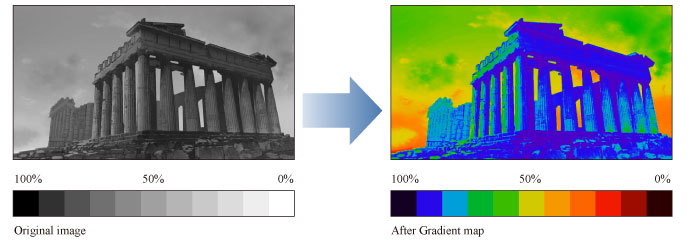
|
|
·To learn how to apply a Tonal Correction effect to a layer, see "Applying a Tonal Correction". ·For information on the settings in the [Gradient map] dialog box, please see the following section. |
[Gradient map] dialog box
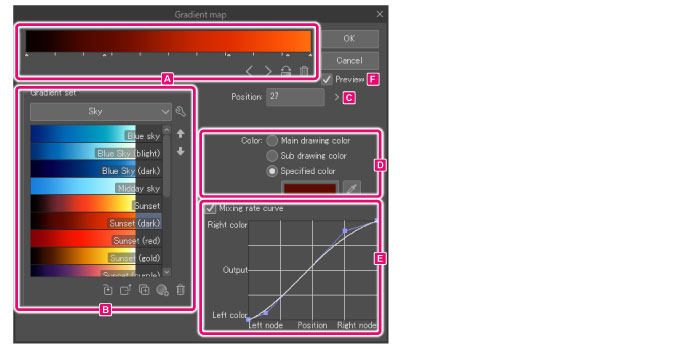
A.Gradient settings
You can edit the gradient by moving the nodes.

(1) Color bar
A preview of the gradient.
(2) Node
Set the color of the gradient. You can create extra nodes by clicking an empty space.
Drag the nodes horizontally to adjust the gradient. Selected nodes are shown in blue.
To delete a node, drag it up or down from the gradient bar.
(3) Select left node
Switches to the next node on the left.
(4) Select right node
Switches to the next node on the right.
(5) Reverse gradient
Flips the gradient colors.
(6) Delete node
Deletes the selected node.
B.Gradient set
Here you can manage the gradient settings.
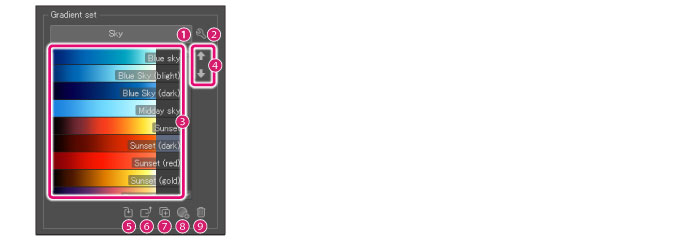
(1) Gradient set lists
Displays a list of gradient sets you can select from.
(2) Show Menu
Opens the gradient set menu.
|
Create new set |
Creates a new color gradient set. |
|
Delete set |
Deletes the selected gradient set. |
|
Duplicate set |
Duplicates the selected gradient set. |
|
Settings of set |
Change the name of the selected gradient set. |
|
Register set as material |
Displays the [Material property] dialog box and allows you to register the selected gradient set to the [Materials] palette. For details on the [Material property] dialog box, see "[Material property] Dialog Box". |
|
Import material set |
Opens the [Import material set] dialog box, where you can import a gradient set registered to the [Materials] palette. For details on the [Import material set] dialog box, see "[Import material set] dialog box". |
|
Add Gradient |
Add the settings of the gradient displayed on the color bar to the list. The added gradient settings are displayed at the bottom of the list. |
|
Delete Gradient |
Deletes the selected gradient from the list. |
|
Duplicate Gradient |
Duplicates the selected gradient. |
|
Change Gradient Name |
Change the name of the selected gradient. |
|
Replace Gradient |
Overwrites the selected gradient with the gradient displayed in the color bar. |
|
Apply to Gradient Settings |
Shows the selected gradient in the color bar. |
|
Import Gradient |
Import a gradient settings file from IllustStudio (extension: cgs). Gradient settings file from IllustStudio (extension: cgs) cannot be imported on tablets/smartphonea/Macs with M1 chips. |
|
|
·Gradient sets registered to the [Material] palette can be uploaded to the Clip Studio server using Clip Studio, the portal application. For details on uploading methods, please see Clip Studio TIPS. ·Clip Studio can be started from the [File] menu ([CLIP STUDIO PAINT] menu on macOS and Tablet) > [Open CLIP STUDIO]. For the Smartphone, select [Menu] > [Usage / Material / Work / Support]. |
(3) Gradient list
A list of gradients in the selected gradient set.
(4) Up/Down
Move the position of the gradient selected in the list up or down.
(5) Replace Gradient
Overwrites the selected gradient with the gradient displayed in the color bar.
(6) Apply to Gradient Settings
Shows the selected gradient in the color bar.
(7) Duplicate Gradient
Duplicates the selected gradient.
(8) Add Gradient
Adds the gradient displayed on the color bar to the list. The new gradient is added to the bottom of the list.
(9) Delete Gradient
Deletes the selected gradient from the list.
C.Position
Indicates the position of the selected node.
D.Color
Indicates the color of the selected node.

(1) Main drawing color
Uses the main drawing color as the node color. If you change the main drawing color with a color palette, the node color will also change.
(2) Sub drawing color
Set the sub drawing color for node color. If you change the sub drawing color with a color palette, the node color will also change.
(3) Specified color
Set a specified color for node color. Click the color indicator to open the [Color settings] dialog box.
|
|
For details on the [Color settings] dialog box, see "Advanced settings of color Dialog Box". |
(4) Obtain screen color [Windows/macOS]
You can use the eyedropper to pick a color from the screen as the specified color.
E.Mixing rate curve
Allows you to adjust the change in color between the selected node and the node to the right.

·The horizontal axis of the graph indicates the position of the nodes.
·The vertical axis of the graph indicates the color mixing ratio with respect to the node at the right. When the value is larger, the color between the nodes will be closer to the color of the node to the right. When the value is lower, the color between the nodes will be closer to the color of the selected node.
·Clicking on the curve allows you to add up to 16 points. which you can drag to adjust the mixing rate curve. To delete a control point, drag it outside the graph.
F.Preview
Turn this on to preview the results on the canvas.
[Material property] Dialog Box
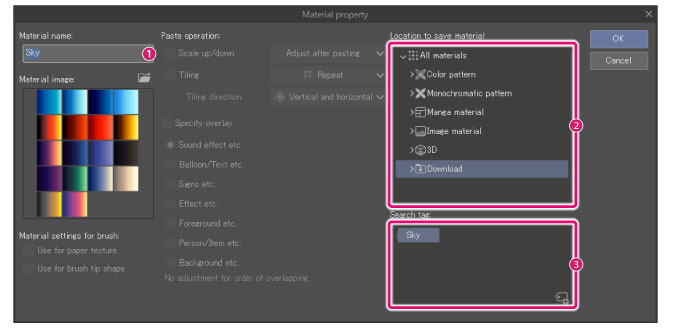
(1) Material name
Enter a name for the material.
(2) Location to save material
Click a folder in which to save the material. The saved location will be applied to the tree view in the [Materials] palette.
(3) Search tag
Here you can specify the search tag that will appear in the tag list.
Click plus icon in the lower right to create a new tag.
[Import material set] dialog box
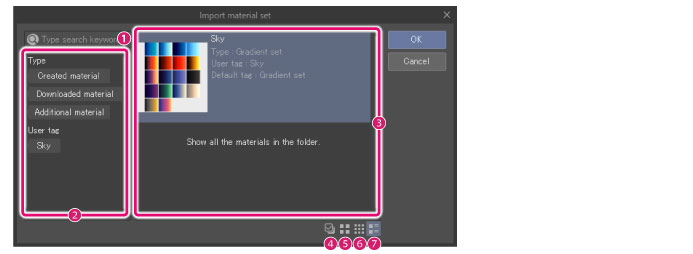
(1) Search box
Enter a keyword to search for a gradient set image.
(2) Tag list
A list of tags assigned to materials. Clicking the button shows the [Gradient set list] from the specified settings in [Gradient set].
(3) Gradient set list
Displays the list of gradient sets.
(4) Show item check box
Shows a checkbox for each gradient set thumbnail in the list. You can select a material by clicking the checkbox.
(5) Large Thumbnails
Shows the gradient sets as large thumbnails.
(6) Small Thumbnails
Shows the gradient sets as small thumbnails.
(7) Detail View
Shows thumbnails and details of the gradient sets.









